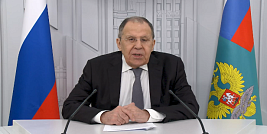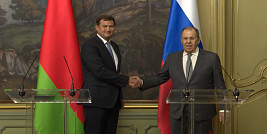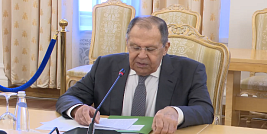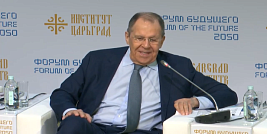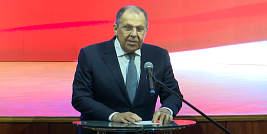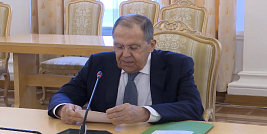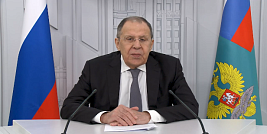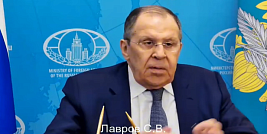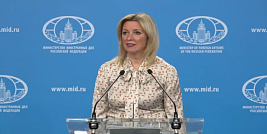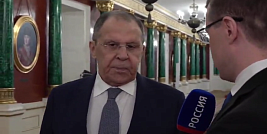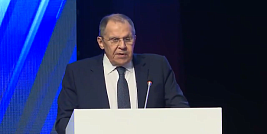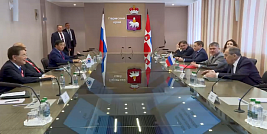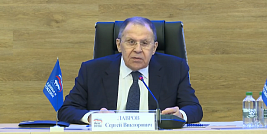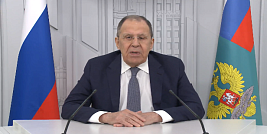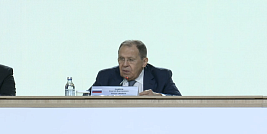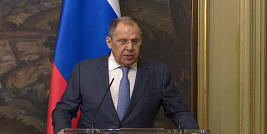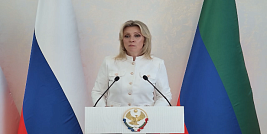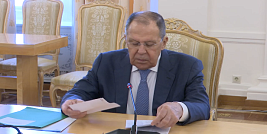Foreign Minister Sergey Lavrov’s statement and answers to media questions following the G20 Ministerial Council meeting, Johannesburg, February 21, 2025
We have concluded the G20 ministerial meeting in Johannesburg.
I wish to extend, through the mass media, our gratitude to our South African friends for their excellent organisation of the discussions, both in terms of substantive content and the resolution of numerous protocol-related and logistical matters.
The main focus of the deliberations among the foreign ministers was the crucial goal of amplifying the voices of developing nations in global decision-making. The discussions were substantial, and we observed tangible progress in this regard.
Since last year, the African Union has attained full membership within the G20. The League of Arab States (LAS) and the Community of Latin American and Caribbean States (CELAC) are interested in securing equivalent status. Such ambitions are commendable. We are confident that, in due course, the EAEU may also rightfully aspire to similar standing, as each of these associations demonstrates positive momentum in their contributions to the development of international economic relations.
We articulated our perspective on international challenges and their resolution during a period when multipolar realities are increasingly acknowledged. The advent of multipolarity is self-evident to us and to the BRICS nations. Statistical evidence underscores this trend.
The combined gross domestic product of BRICS states has surpassed that of the G7 countries. BRICS accounts for 37 percent of global GDP, compared to the G7’s 29 percent. This disparity heightens the urgency of reforming global economic institutions to reflect the genuine weight of the Global South and the World Majority within the world economy, alongside fostering non-discriminatory economic ties. These matters were actively deliberated. Russia stands ready to vigorously facilitate further progress in this domain, though numerous challenges persist.
A majority of participants in the Johannesburg meeting acknowledged the extremely low likelihood that the UN-approved 2030 Sustainable Development Goals will be fulfilled. Merely 17 percent of these Goals currently exhibit prospects for realisation.
Concurrently, global inequality continues to rise, compounded by other systemic challenges confronting developing states. We welcome measures aimed at augmenting technology transfers, additional preferential funding, and food assistance to developing nations. While these steps are long overdue, they remain insufficient to fundamentally alter the trajectory.
The global economy is marked by disproportionate growth in defence and military expenditures. According to Western experts, such outlays now total $2.4 trillion annually. An egregious example is the regime of Vladimir Zelensky, which has absorbed (or at the very least, absorbed) hundreds of billion dollars in military aid – resources that could have been allocated to vital global development programmes, particularly in Africa.
The IMF and World Bank have set records in sustaining Zelensky’s regime through loans and credit facilities vastly exceeding the sums allocated to African and other developing nations. We underscored that global stability was being undermined, with profoundly negative repercussions for the world economy.
We urged our Western counterparts to respect universally recognised rules of international law. Emphasis was placed on revitalising the United Nations’ role as a platform for coordinating state actions and forging a fair balance of interests. The stabilising influence of consensus-based multilateral frameworks on international economic relations was also highlighted. These include the SCO, the EAEU, the African Union, LAS, and the aforementioned CELAC. Collectively, they offer enhanced opportunities to address emerging regional challenges.
The role played by BRICS certainly attracts everyone’s attention at the global level. We briefed our colleagues in detail on the results of last year’s summit in Kazan where a number of promising ideas were formulated in terms of the G20 mandate: agreements to launch BRICS payment and settlement mechanisms, an investment platform, and a grain exchange.
Speaking about entities that play a certain role in international economic relations, the G20 in general retains the role of a dialogue platform between the old and new centres of power. We spoke in favour of preserving the economic profile of this association as it was intended and agreed at the very beginning of its creation in 2008, without politicising the G20 agenda as our Western colleagues have been trying to do in recent years, seeking to “Ukrainianise” the agenda. These attempts have always failed. They take a lot of energy and nerves from the participants, especially the Sherpas.
We drew the attention of our colleagues to a significant date, especially as it is being celebrated in the year of Africa’s G20 presidency – the 65th anniversary of the United Nations Declaration on the Granting of Independence to Colonial Countries and Peoples.
Our country (back then the Soviet Union) played a major role in the adoption of this historic document. Despite the successes achieved by the countries of the Global South freed from the burden of exploitation, the problem has not been completely resolved. There remain 17 non-self-governing territories in the world. Colonial dependency has largely given way to neo-colonial dependency. Former parent states and Western transnational corporations have monopolised markets and supply chains and are using their advantages to extract natural resources and raw materials from countries in Asia, Africa and Latin America. Then they add value at their own enterprises making maximum profit from the whole process.
This is abnormal in the twenty-first century. We support our partners from the World Majority nations who are speaking out more and more loudly and insistently in favour of liberation from neo-colonial practices.
South Africa, which has led the G20 this year, completes the succession of BRICS presidencies that began in 2022, when Indonesia was at the head of the G20. In 2023 it was India, and in 2024 it was Brazil. This successive version of BRICS being at the helm of the G20 has had the positive outcome of strengthening the position of the Global South in our forum. All this contributes to the establishment of a fairer multipolar world order based on the sovereign equality of states, as required by the UN Charter, and on all other principles of the Charter in their totality and interrelation.
Overall, we are satisfied with the outcome of the meeting. Disagreements have not disappeared, but the conversation is continuing. This is always useful. I believe that in Johannesburg, we managed to set a positive vector for further interaction within the G20, to draw attention to acute problems, first and foremost on the African continent, but also in other countries of the Global South.
This is a good and useful contribution to the work on the preparation for the G20 Summit in Johannesburg in November 2025.
Question: You said that the G20 is above all an economic association. However, all representatives of South Africa, opening the year of its presidency, among other economic challenges, set the goal of achieving consensus on the Ukrainian crisis in the G20. How successful is this, in your opinion? Is such a consensus possible, given the composition of the participants?
Sergey Lavrov: I am not aware of the fact that the South Africans had set themselves such a goal. I followed closely how they assumed their position and how our Sherpas worked. They had no such task.
Yesterday, I was received by the President of South Africa Cyril Ramaphosa. Today, I had a long conversation with the South African Minister of Foreign Affairs Ronald Lamola. They confirmed that they fully support the need not to deviate from the originally agreed mandate of the G20 – trade, financial, economic, logistical, and transportation issues.
I did not see it that way. And my colleagues who worked on the preparation of the ministerial meeting did not see such a trend.
Question: As is known, the United States ignored the ministerial meeting in Johannesburg at a high level. At the same time, previous summits and meetings were openly torpedoed by the West in an attempt to impose the Ukrainian agenda. How can such a destructive EU influence be neutralised? Does the G20 have a future?
Sergey Lavrov: You said the previous meetings were torpedoed by the West’s attempts to Ukrainianise them. I would say this is not an entirely correct way to put it. Previous attempts by the West to Ukrainianise the G20 agenda were torpedoed by other participants in that association.
If you look at the final documents, after all the G20 participants agreed to include a small text on geopolitical issues by way of compromise, you will not find anything in them that could be rejected by the Russian side. They mention a large number of emerging challenges, including the Palestinian problem that was highlighted at the 2024 summit, alongside what is happening in the Gaza Strip and in the Middle East in general.
However, our experts spent a lot of time to harmonise these small texts. And they had no impact whatsoever on the problems of Palestine, Ukraine or Africa, where conflicts are again on the rise. This is because there is an appropriate format for all political crises.
On the bright side, I would like to note that these “inserts” in the declarations of the G20 leaders have in no way affected the essence of economic discussions, which were in the interests of forging a multipolar world order, and agreements formulated in these documents.
Question: The aggressive World Minority is dwindling every day yet remains as aggressive. Statements from Olaf Scholz, Emmanuel Macron and Kaja Kallas are becoming increasingly rhetorical. What do you think they are hoping for? And what will they most likely face?
Sergey Lavrov: This bewilders me as well. The European Union’s High Representative for Foreign Affairs and Security Policy, Kaja Kallas, spoke at the G20 with the same array of accusations, proclaiming certain “plans” that would prevent Russia from taking its rightful place in the world. There is some tragicomic element to this.
I noted her remarks about the Russian-American meeting in Riyadh on February 18 this year. She said that the “TV picture” with the Russian Foreign Minister and the US Secretary of State and the national security advisers of Moscow and Washington standing there gave the impression to the entire world that Russia was a winner. This mentality has not disappeared since long ago, since the collapse of the Soviet Union, when it was necessary to build new relations in the European part of Eurasia – it was always either/or – either you are with us or against us.
When the first coup d’état took place in Ukraine in 2004, we didn’t believe it was a manifestation of hostile Western policy, yet these problems persisted and worsened. Under pressure from the United States, the Constitutional Court of Ukraine did not recognise Viktor Yanukovich’s victory in the second round and ordered a third round of voting, though it was not provided for in the Constitution. As a result of unbridled manipulations in the third round, election victory came to Viktor Yushchenko.
Before the third round of voting, Belgian Foreign Minister Karel de Gucht publicly stated that he urged Ukrainian voters to make the “right” choice: either they are with Russia or with Europe. This confrontational attitude has not vanished. Behind it lies the desire not to let anyone escape the “supervision” and influence of Western countries. They are still trying to use the same tactics in all parts of the world, including the post-Soviet space.
Speaking of the people who are now trying to express an assessment of Western countries and prevent a rift among them, I cannot fail to mention NATO Secretary General Mark Rutte. He speaks as if he were the president of a large and powerful country rather than a clerk obliged to reflect the consensus opinion of all NATO members. He is travelling all over the world, to the capitals of the Alliance member states, demanding that no peace settlement should be allowed which would let Russia get at least some benefit from the special military operation.
According to our information, he is “mentoring” Zelensky, telling him to stand his ground, not to show weakness before the start of negotiations, and emphasising the inadmissibility for Kiev to hint at the possibility of softening positions and “territorial concessions”. This is bacchanalia. This man (in this case, Mark Rutte) is abusing, grossly violating his functional duties.
Not all NATO members take such a barefaced stance. Not all of them want to continue wasting money on arming Ukraine, to subordinate all the work of both NATO and the European Union to Zelensky’s wishes. So the truth will triumph.
Today more sensible voices are heard not only from a number of European countries but also from Washington. We have spoken in detail about the outcome of our talks. Russian President Vladimir Putin has touched on this subject several times. The main thing is not that we are giving in to someone or that someone is giving in to us. This “either/or” should not exist. There must be an understanding that politics and diplomacy is, first and foremost, a dialogue, a desire to hear the partner and find in his statements what coincides with your own interests. Then there appears consensus on certain issues, which does not mean that disagreements will be completely eliminated. This will never happen. The main thing is to achieve results in the areas where interests coincide, and to translate them into practical actions, including in the economy. As for the areas where interests diverge, we must not allow this divergence to degenerate into a confrontation, especially a hot one.
Question: How have your G20 counterparts from friendly nations received the resumption of the Russian-American dialogue? How might this impact the formation of a multipolarity sought by the World Majority states?
Sergey Lavrov: All welcomed our meeting. They understand that this does not signify the conclusion of the era of confrontation between Russia and the West. However, the very initiation of dialogue itself represents a return to normalcy, a fact universally acknowledged and welcomed.
The reaction of the “tragicomic figures” heading the Brussels bureaucracy and NATO to the meeting in Riyadh is highly illustrative. The mere fact that representatives of two great powers sat down, engaged in discussion, and articulated their respective positions is perceived by them as a betrayal of Western interests. These individuals are not in good health.
By and large, all our counterparts from the World Majority share this assessment. Perhaps not all express it directly. Yet, based on prevailing sentiments, this is indeed the case.
Question: In the draft UN General Assembly resolution prepared by Great Britain, France, the Federal Republic of Germany, Canada, the Baltic states, and several other European nations ahead of February 24, Moscow is demanded to withdraw its forces from Ukraine “immediately” and “unconditionally.” Notably, the United States has refrained, for the first time since the start of the special military operation, from co-sponsoring such a resolution on Ukraine. In your view, does this indicate a shift in Russian-American relations and the beginning of a thaw?
Sergey Lavrov: This reflects the pragmatism inherent in the policy of the Donald Trump administration. During meetings with leaders of several states – confirmed in discussions with Indian Prime Minister Narendra Modi and likely in engagements with other representatives of the World Majority – he has emphasised that his guiding principle is common sense.
This is the sole factor I perceive as influencing the altered list of co-sponsors of this latest purposeless, dead-end resolution you mentioned.
Question: What issues is the Russian Foreign Ministry addressing in preparation for a potential meeting between Presidents Vladimir Putin and Donald Trump? When might it take place?
Sergey Lavrov: When it occurs, you will be informed.
What issues are under consideration? Confidentiality constitutes an integral element in preparing any diplomatic process. Thus, I am certain we will communicate updates in due course. However, the Kremlin press service will issue notifications first and foremost.
Question: US Treasury Secretary Scott Bessent has stated that the possibility of easing sanctions against Russia could be discussed within the framework of negotiations on the Ukrainian crisis. What is Moscow’s position regarding Western sanctions? Can a resolution of the Ukrainian crisis be achieved without a comprehensive settlement of the sanctions issue that takes into account Russia’s interests?
Sergey Lavrov: We do not broach that subject. Our stance is rooted in the fact that this constitutes a gross violation of the very principles the West itself enshrined in the global economic order: fair competition, inviolability of property, the presumption of innocence, and free-market mechanisms. All these tenets have been dismantled. To this, we must add the outright theft of Russian assets. It is shameful. They have not merely stolen but are now exploiting the accrued interest to fund the war against our country through Ukrainian proxies.
Recent reports indicate that several Western companies are prepared to return and resume operations in Russia. I believe our economic officials have responded appropriately. The essence of their position is as follows: over the years of this hybrid warfare, including through unlawful sanctions, we have taken significant steps to drive the robust development of domestic industries that previously relied heavily on the United States, the European Union, Japan, and others. This newfound state has enabled us to appreciate the value of mastering our own technologies for the prosperity of our economy, which, in certain instances, have already surpassed their Western counterparts.
A similar logic should guide our approach to the potential return of Western companies to Russia (there is no need to dissuade them). However, their re-entry should be permitted only in sectors that do not pose risks to our economy should certain parties once again wake up on the wrong side of the bed.
The same holds true for sanctions. In many respects, they compelled us, but through this, they also gave us a lesson and inspired profound reforms and a fundamental restructuring of our economy to ensure comprehensive, sovereign, and independent development, free from the whims of those who still presume dominance over global affairs, including the world economy.
I will conclude where I began. Multipolarity is gaining ascendancy. The growth trajectories of new, formidable centres of power – economic, political, and financial – demonstrate that this multipolarity is irreversible. In this context, the G20 retains its relevance as a forum where Western participants may come to recognise the inevitability of this process and begin adapting to it.
We do not assert that multipolarity excludes the West. They too are part of our planet, the global economy, and international affairs. The G20 serves as a viable platform for exchanging views, clarifying positions, and educating our Western counterparts.

